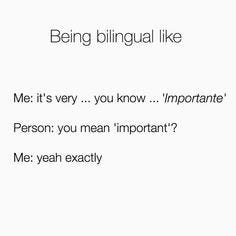Welcome, [budding] polyglot, this post is primarily for those who struggle to keep words straight when working with more than two languages. While I understand this is not something that everyone has experienced, I hope that it is something that everyone will experience. It is confusing and hilarious and when you get it figured out it is powerful.
Mixing up words and forgetting words is something that just about everyone who learns a second language experiences. The worst part is, most of the time, it doesn't happen until in the moment speaking with someone. All of a sudden the word is just gone, not only in the target language but also in the native language and any other language that's known. All this to say, if it happens to you it is completely normal and no, you are not losing your language.
Keeping it Straight
If working within a specific language family it is possible, and likely, that you will experience this at a higher rate. When I was learning French I would constantly confuse the Spanish and French words and it got even worse when I began to study Portuguese. These are things that are not unique to Romance languages, but that is where I felt it.
What happened next I would not have believed had it not happen to me. I began to forget words in my native language. Suddenly I couldn't speak the language I had spoken for 18 years of my life and the other two I could speak I was barely able to hold conversations in at the time. I thought this was going to be something that I always dealt with and, to a certain extent, I was right. There are still times when I lose words and there are still times when I replace words in one language with words from another. However, after many years I have developed some strategies for keeping the languages separate.
Read More
One of the best ways to begin compartmentalizing languages is by reading more. The more often you see and hear and use the word the less likely you are to use it in place of another word in another language, though this may not be true for your native language. Just five to ten pages every day in whichever languages you're working on will help. This is a strategy I use and one of the things I do that I think really helps is I read these pages back to back. Whether starting out reading comics and easier books or reading philosophy and the classics in the target languages, this will help in more ways than just compartmentalize languages.
Switch as often as possible
This idea may seem slightly counterintuitive, but I have had great success using it. When I first was learning French, one of the greatest things that happened to me is I lived with a family where I spoke English with the mom and French with the dad. After just a few months I was able to switch back and forth seamlessly which only began to get difficult as I did it less and less.
With this in mind, switch back and forth on your language study days. Watch an episode in Spanish then watch it in French or German or Russian or whatever languages you're learning. Read ten pages in one language then read ten pages in the next language. Write 5 sentences in one language then write 5 sentences in the other language. Whatever you are doing try to be doing it in whatever languages you're learning as quickly in succession as possible.
Fair warning, this is going to be difficult and extremely exhausting. However, if you stick with it then it will pay off in the long run. Even now I struggle when switching back and forth, but things always get smoother when I get back to practicing simultaneously. I wish I could say there were a simple cure or that I had the answer for how to make sure you'd never confuse words again, but I just can't say that. I do know, from my experience, that the more you switch the easier it gets to switch. Practice doesn't make perfect. Practice makes permanent.
Conclusion
This is just a short post to address something someone brought up yesterday. If you have questions feel free to leave them in the comment section below or over on Twitter. I will do my best to address everything as it comes up. I understand this will be particular to a select group of people, but I genuinely do hope that everyone reading this ends up experiencing this issue. Becoming bilingual is difficult, but you can do difficult things and be great. So go do difficult things and become great. Here I’ve given you some of the tools, but in the end, there is no comprehensive guide, no tips or tricks to carry anyone across the finish line. Language acquisition requires time, effort, and consistency. That said, it is something that anyone of any age is more than capable of accomplishing. I’ll be here rooting for you and watching your progress.
For more content find me on Twitter or Instagram. I look forward to seeing everyone’s progress in the months and years to come.






